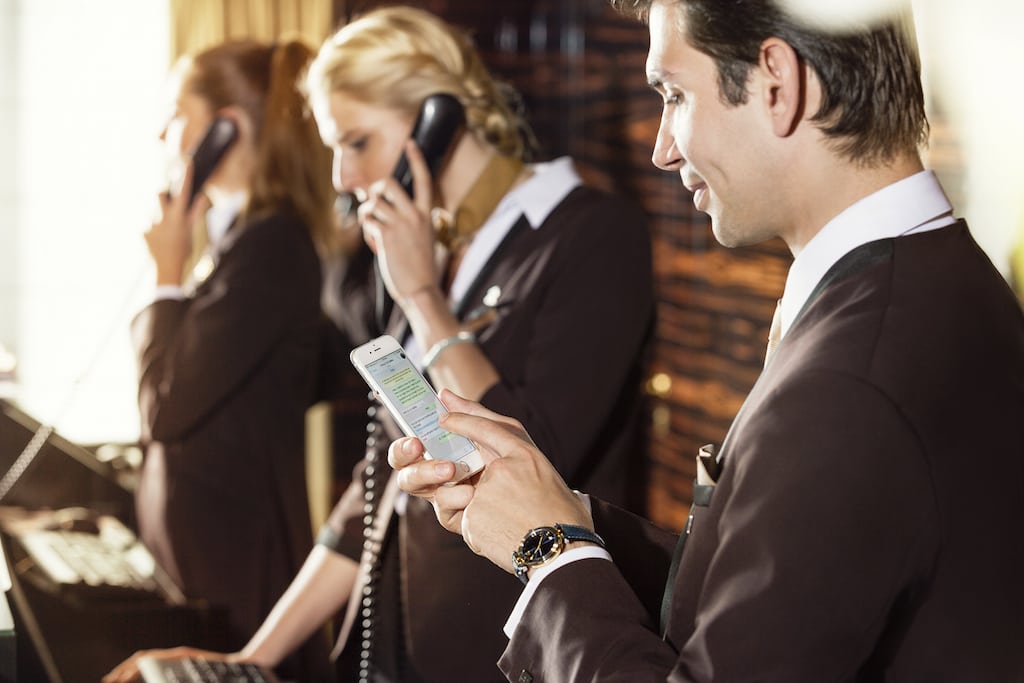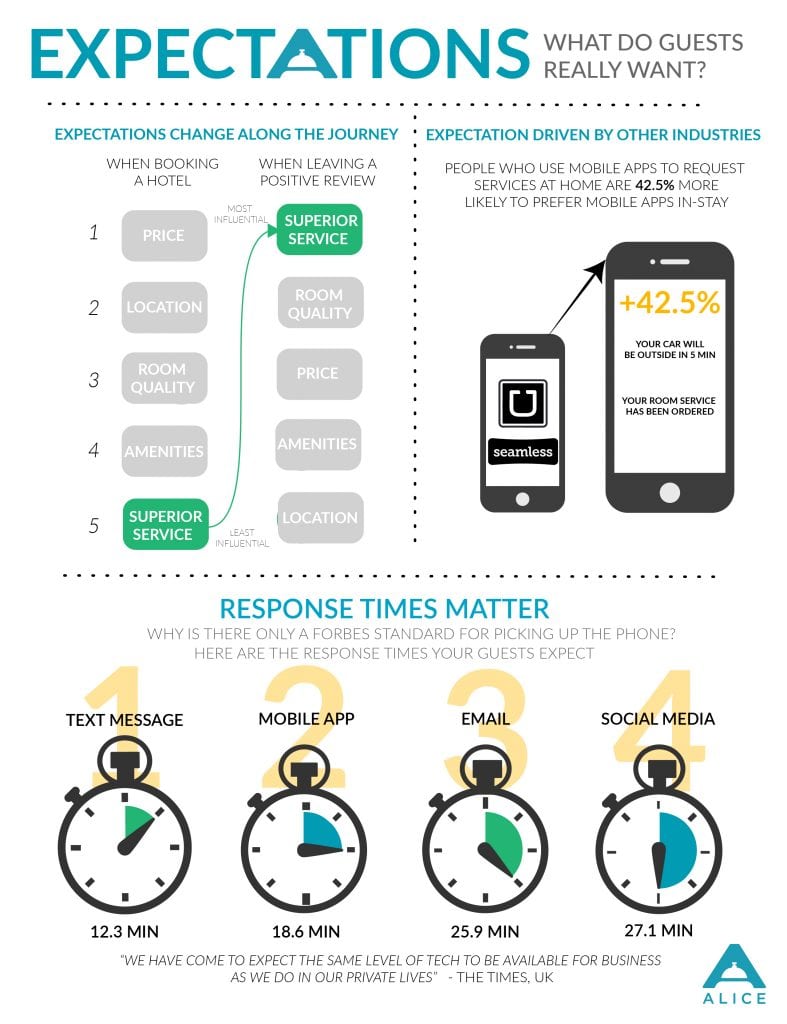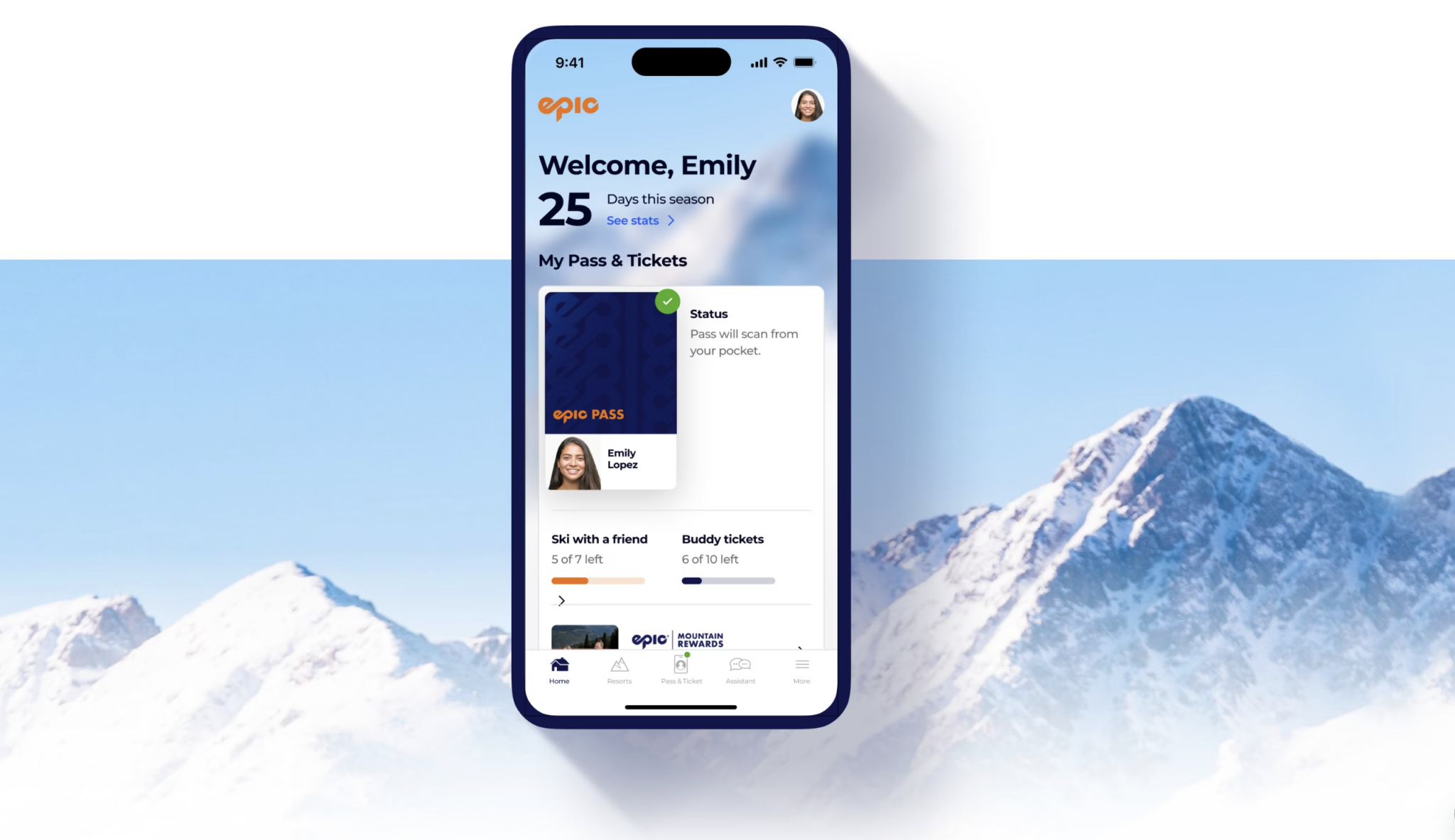Hotels Find That Guests Won’t Wait When It Comes to Mobile Messaging

Skift Take
New survey data and research suggest hotels should be paying even more attention to mobile messaging and requests from guests than they already are.
Alice, a technology platform that connects hotel departments and guests, recently conducted a survey of 400 people to determine how long a hotel could wait to respond to a request via digital channels (text messaging, mobile apps, email, and social media) before a guest became frustrated.
The survey found that, on average, people were willing to wait about 12 minutes for a response to a text message, approximately 19 minutes for a mobile app request, about 26 minutes for an email reply, and 27 minutes for a response to a request delivered via social media. Alice collected responses from 400 people who have booked and stayed in a hotel within the last six months and earn more than $60,000 in annual income.
 Alex Shashou, co-founder and president of Alice, said he found it compelling that while many hotels have a standard response time of three rings for answering telephone requests from guests, as noted in the guidelines for the Forbes Travel Guide, for example, they don’t seem to have the same standards in place for digital requests.
Alex Shashou, co-founder and president of Alice, said he found it compelling that while many hotels have a standard response time of three rings for answering telephone requests from guests, as noted in the guidelines for the Forbes Travel Guide, for example, they don’t seem to have the same standards in place for digital requests.
“Hoteliers are treating digital differently,” he told Skift. “Just because it’s another channel, that doesn’t mean hospitality shouldn’t be brought into it. Three rings is the right amount of rings, but there’s no standardized response time for texts or messages. We wanted to answer, what does it mean to deliver on what guests expect today?”
Based on the survey results, Shashou said Alice is “building these times into our system so we’re gamifying around that.”
As some competitors are trying to do, as well, the Alice platform enables hotels to communicate with guests and among their staff to address requests and streamline operations. It should be pointed out that the survey results coincide with Alice’s business goals.
The Increasing Importance of Mobile in the Guest Journey
Luke Bujarski, Skift research director, said the survey findings from Alice speak to the “prioritization of the various mobile channels and what types of messages hotels receive from them.” He added, “The results demonstrate immediacy. What should hotels be prioritizing in terms of requests and, if they do, which channels should they be communicating through?”
According to Alice’s data, it seems more travelers expect immediacy from text, followed by mobile apps, email, and social media.
Bujarski noted that Skift’s own recent in-destination traveler survey of 1,200 travelers, conducted in June, showed that people on the go are actually more connected to their smartphones than they are when they are at home. “The smartphone becomes your travel guide, your travel buddy as you step into a foreign environment and lean on the various functions that your smartphone can perform. The bottom line is that hotels need to recognize that mobile channels are important.”
Alice’s survey also showed that guests who use mobile devices are 42.5 percent more likely to prefer using mobile communications when ordering food and beverage and pre-stay services at hotels.
Hoteliers, Bujarski said, also need to realize that guests have particular preferences for different channels, and that those preferences differ for everyone.
Preliminary research being conducted by Skift in a survey of business travelers showed that 40 percent of avid business travelers were “not at all likely” to download a hotel app as a means of communication with hotel staff.
“Hotels have to be considerate about the channels that they put out in front of their customers,” Bujarski said. “Even though we have so many digital channels out there and everyone in the industry wants to be ‘mobile first,’ when it comes to customer success ultimately not everyone will be accessing them. You have to prioritize channels in line with what consumers want.”
Hotels’ Varying Approaches to Mobile Messaging and Requests
As Skift outlined in an article published in August, smart hotels are recognizing the need to use messaging to connect to guests, and they are certainly prioritizing certain channels over others.
Hospitality companies with multiple brands, such as Hilton and Marriott, for example, plan to make their respective mobile apps the No. 1 channel through which they communicate digitally with guests. Other hotels, such as Starwood’s properties in Europe, Africa, and the Middle East, for example, are communicating directly with guests via messaging apps like WeChat, iMessage, WhatsApp, and others.
And other companies, including InterContinental Hotels Group and Hyatt, want to enable guests to do both — to communicate via proprietary mobile apps and through other messaging platforms like Facebook Messenger.
Smaller hotel companies and independents are often turning to third-party platforms like Alice and CheckMate, for instance, to find messaging solutions.
“Obviously, everyone is different in terms of expectations and response times but this data from Alice, combined with Skift’s proprietary research, shows the increasing importance of messaging and request channels like text, mobile apps, email, and social media,” said Bujarski.
“It speaks to how your build your customer service strategy at its core. The Alice study speaks to customer expectations regarding mobile requests, but hoteliers should also remember that certain guests may still prefer more traditional channels over mobile. No matter what, they need to maintain a customer-centric view.”
And, he added, sometimes nothing can replace the traditional phone call, either.
“Guests aren’t stupid,” Bujarski said. “If it’s something more urgent, they’re going to pick up the phone and call the front desk instead of posting something on social media.”




